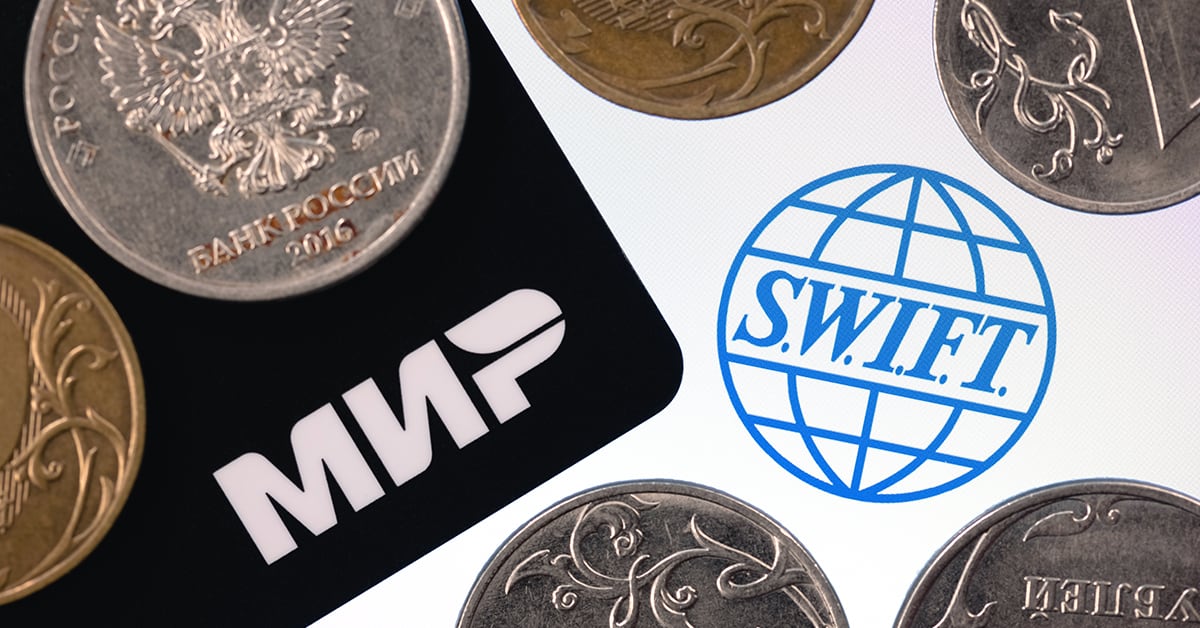Despite a raft of sanctions announced by the US and other countries targeting Russia's biggest banks, there is no international consensus aboutremoving Russia from the Swift network—yet.

The Brussels-based banking network SWIFT has remained tightlipped, despite being at the center of a brewing international storm over whether to cut Russia off from the financial messaging network, which connects more than 11,000 banks globally.
Since Russia launched its invasion of Ukraine at 5am Kyiv time on February 24, SWIFT, which was set up 40 years ago to enable banks to directly communicate with one another about cross-border payments, has been embroiled in the middle of the unfolding Russia-Ukraine crisis. On Twitter, one member of the German parliament, Norbert Röttgen, described SWIFT as “…our sharpest sword to hit in case of an attack.”
Despite a raft of sanctions announced by the US and other countries against Russia’s biggest banks and its oligarchs, cutting them off from the US financial system and freezing their US-domiciled assets, there are growing international calls, including from Ukrainian president Volodymr Zelenskyy, for Russia to also be removed from SWIFT.
“Russia should be blocked from SWIFT now, otherwise it will have money to fund war,” Ukrainian MP Halyna Yanchenko proclaimed on France24 television.
In a short statement, SWIFT said it is a neutral global cooperative set up and operated for the collective benefit of its community of more than 11,000 financial institutions in 200 countries. “Any decision to impose sanctions on countries or individual entities rests solely with the competent government bodies and applicable legislators,” the statement read.
While not ruling out the SWIFT option at a later date, Biden said it was not the position the rest of Europe wished to take at this time and that he wanted to see if the current package of sanctions, which he described as profound, were working before taking that step. He also said the sanctions imposed by the US would “maximize the long-term impact on Russia and minimize the impact on the United States and our allies.”
On Friday, UK Foreign Secretary Liz Truss was said to be trying to persuade EU states to bite the bullet and cut Russia off from SWIFT, which processes an average of 40 million messages a day relating to payments and other transactions. The EU is said to be “analyzing” banning Russia from SWIFT, but a split appears to be emerging in the economic bloc between those countries, such as France, which are reported to be in favor of a SWIFT exile, and countries like Italy, Hungary and Germany, which have “reservations.”
Germany has expressed concerns about “technical difficulties.” Cutting Russia off from SWIFT may not be as easy as flicking a switch as it is a global messaging network, and other banks could be impacted. One also has to consider the close banking and financial ties that exist between certain EU countries and Russia. For example, Austria’s Raiffeisen Bank, according to Bloomberg, has €11.6 billion worth of loans, and more than 30% of its pre-tax profit, in Russia. Italian banks have more than $25.3 bn in amounts outstanding from Russia, according to the Bank for International Settlements, making it the most exposed along with French banks.
Germany’s largest bank, Deutsche Bank, has a long history in Russia—more than 140 years—according to its website. It recently provided a $871 million credit facility to the Irkutsk oil company in Siberia in December, just as Russia started ramping up its military presence on Ukraine’s borders.
Others aren’t convinced that SWIFT is the most effective option in terms of hitting Russia where it hurts most.
“SWIFT is considered a nuclear option with all the concerns about going ‘nuclear’,” a former banker told Global Finance. “But at the end of the day it is a messaging system. SWIFT is the secure message carrier from A to B, B to A. Other comms like tested telex (very ancient) or fax do still exist, but shutting access to major currency clearing systems like US dollars, and sanctioning any banks that touch this stuff, is highly effective.”
“Oh, how the great & the good have got it oh so wrong on the topic of SWIFT,” Olaf Ransome, who describes himself as a long-time banking operations veteran and the founder of Zurich-based 3C Advisory, opined on LinkedIn. “SWIFT does not make payments, it delivers messages securely from one place to another, like FedEx delivers packages and like Jason Statham in the Transporter, it never opens the package. SWIFT is the wrong lever to pull on. Sanctions lists will be more effective.”
Perhaps the so-called nuclear option, or ‘sharpest sword,’ is not that sharp or nuclear after all, particularly in an era where cryptoassets such as Bitcoin have emerged as an important alternative funding method, which can bypass financial institutions that may be blocking payments to groups such as the military or sanctioned government officials. And, if all else fails, there are always back-ups such as the telex or fax.



